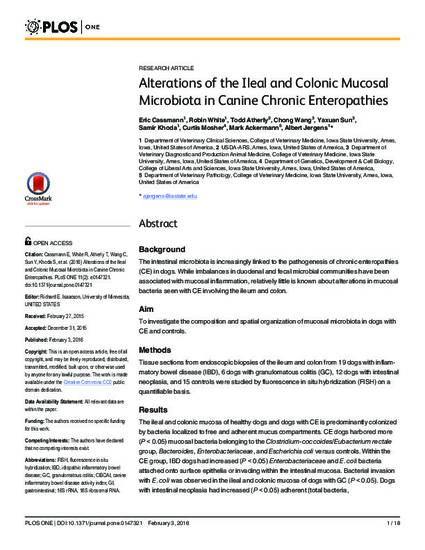
Background
The intestinal microbiota is increasingly linked to the pathogenesis of chronic enteropathies (CE) in dogs. While imbalances in duodenal and fecal microbial communities have been associated with mucosal inflammation, relatively little is known about alterations in mucosal bacteria seen with CE involving the ileum and colon.
Aim
To investigate the composition and spatial organization of mucosal microbiota in dogs with CE and controls.
Methods
Tissue sections from endoscopic biopsies of the ileum and colon from 19 dogs with inflammatory bowel disease (IBD), 6 dogs with granulomatous colitis (GC), 12 dogs with intestinal neoplasia, and 15 controls were studied by fluorescence in situ hybridization (FISH) on a quantifiable basis.
Results
The ileal and colonic mucosa of healthy dogs and dogs with CE is predominantly colonized by bacteria localized to free and adherent mucus compartments. CE dogs harbored more (P < 0.05) mucosal bacteria belonging to the Clostridium-coccoides/Eubacterium rectale group, Bacteroides, Enterobacteriaceae, and Escherichia coli versus controls. Within the CE group, IBD dogs had increased (P < 0.05) Enterobacteriaceae and E. coli bacteria attached onto surface epithelia or invading within the intestinal mucosa. Bacterial invasion with E. coli was observed in the ileal and colonic mucosa of dogs with GC (P < 0.05). Dogs with intestinal neoplasia had increased (P < 0.05) adherent (total bacteria, Enterobacteriaceae, E. coli) and invasive (Enterobacteriaceae, E. coli, and Bacteroides) bacteria in biopsy specimens. Increased numbers of total bacteria adherent to the colonic mucosa were associated with clinical disease severity in IBD dogs (P < 0.05).
Conclusion
Pathogenic events in canine CE are associated with different populations of the ileal and colonic mucosal microbiota.
Available at: http://works.bepress.com/mark_ackermann/104/

This article is from PLoS ONE 11(2): e0147321. doi:10.1371/journal.pone.0147321.